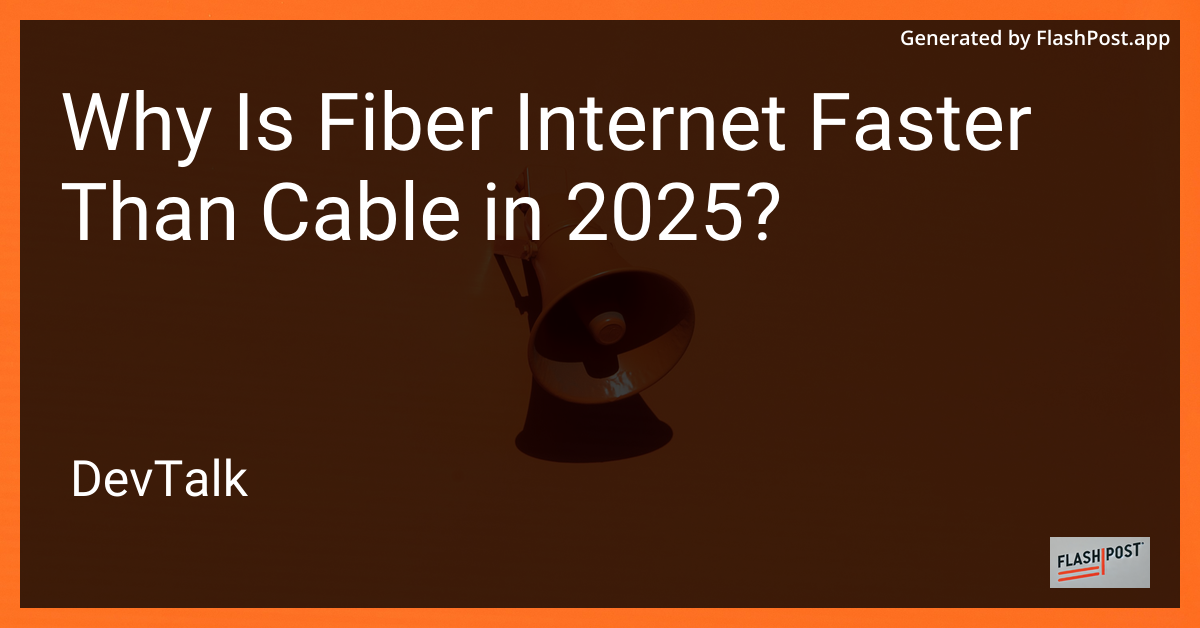Why Is Fiber Internet Faster Than Cable in 2025?

Why Fiber Internet is Faster than Cable in 2025
In 2025, the quest for high-speed internet is more crucial than ever, with fiber internet leading the race against cable.
If you’re wondering why fiber internet is outpacing cable in terms of speed, you’re in the right place. This article explores the key reasons why fiber optics are blazing past traditional cable technologies.
1. Technology at its Core
Fiber internet relies on fiber-optic cables, which use light to transmit data. This differs significantly from cable internet, which uses copper wires to send electrical signals. The intrinsic properties of fiber allow it to transfer data faster and more efficiently than its copper counterpart. The light signal in fiber optics can travel long distances without significant loss of quality or speed.
2. Higher Bandwidth Capabilities
Fiber optics offer far greater bandwidth than cable, which is crucial for modern-day internet usage. In 2025, as more households rely on high-speed connections for activities like 4K streaming, gaming, and remote work, the requirement for high bandwidth becomes imperative. Fiber can handle hundreds of terabits per second of data, compared to cable’s limited capacity. This means smoother, faster, and more reliable internet connections.
3. Symmetrical Speeds
A significant advantage of fiber internet in 2025 is its ability to provide symmetrical download and upload speeds. This means that the upload speed is just as high as the download speed, which is not typically the case with cable internet. High upload speeds are essential for video conferencing, cloud computing, and other bandwidth-intensive tasks, making fiber the preferred choice for both consumers and businesses.
4. Reduced Latency
Latency, the time it takes for data to travel from one point to another, is significantly lower in fiber networks compared to cable. In a future where virtual reality (VR) and augmented reality (AR) are becoming mainstream, low latency is crucial for seamless experiences. Fiber reduces latency issues, providing a faster and more responsive connection.
5. Future-Proof Technology
Investing in fiber is investing in a future-proof technology. As demands on internet infrastructure grow, fiber can scale effectively without necessitating new infrastructure. Cable networks, by contrast, may struggle to keep up with future demands, leading to potential bottlenecks and service slowdowns.
6. Environmental Considerations
The use of fiber optics also supports a greener planet. Fiber-optic cables are more energy-efficient than copper cables used in traditional cable internet. With the world focusing on sustainability in 2025, switching to fiber helps reduce the carbon footprint associated with internet services.
Conclusion
As we advance further into the technological era, the need for faster, more reliable internet is undeniable. Fiber internet not only meets these demands but surpasses them, making it the superior choice compared to cable internet in 2025. Whether you’re in Minnesota looking for the best internet providers or trying to configure internet access for Vagrant, understanding why fiber is the future is beneficial.
If you’re also exploring smart home technology and wondering whether smart locks require internet to function, investing in excellent fiber internet can enhance the reliability and performance of your smart devices.
Fiber internet not only keeps up but also sets the pace for our rapidly digitizing world. Make the switch and embrace the future of connectivity today.